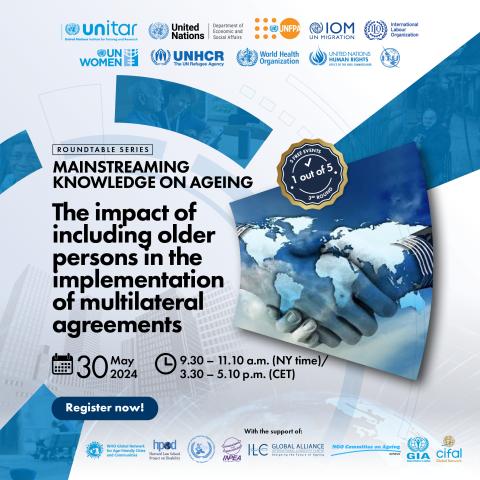
3rd. Year. VIRTUAL ROUNDTABLE SERIES. "MAINSTREAMING KNOWLEDGE ON AGEING". 1st. Event out of 5 (1 hour, 40'): "The impact of including older persons in the implementation of multilateral agreements"
General Scenario for the whole series
Since the Virtual Roundtable Series “Mainstreaming Knowledge on Ageing” started in 2022, the partners and participants have successfully taken stock on the current scenario of ageing and the human rights of older persons in the first year, and on access to justice, labor markets, political participation, health and social care services, as well as cultural and leisure activities in the second year.
This year, the series will be focused on quality of life for older persons. This initiative is aligned with the efforts envisaged at “Our Common Agenda” to strengthen and accelerate multilateral agreements, particularly the 2030 Agenda for Sustainable Development, towards making a tangible difference in people’s lives; in the same vein, it considers relevant aspects on the protection of the human rights of older persons.
In our series, we view national, regional, and international standards, as well as public policies, programs, and other initiatives as key learning elements. In the same vein, we consider that heightening awareness of ICT/digital accessibility implementation from design is relevant to better understand how older persons can benefit from digital products and services as means to actively participate in political, cultural, and socio economic activities. By involving diverse stakeholders as co-sponsors, experts, speakers, and attendees, we aim to enhance discussions and build stronger synergies towards achieving our common goal.
The human rights of older persons and frontier issues, such as the demographic worldwide scenario, gender, human mobility, digital divide, and climate change, will continue as the heart of our discussions.
In this endeavour, UNITAR and its International Training Centres for Authorities and Leaders -CIFAL Global Network-, UNDESA, UNFPA, IOM, UNWOMEN, UNHCR, WHO, OHCHR, ITU and ILO; together with the Group of Friends of the Human Rights of Older Persons UN Geneva; the Global Initiative on Ageing Foundation, GIA; the International Network for the Prevention of Elder Abuses; the International Longevity Centre; and the NGO Committee on Ageing Geneva; and the Harvard Law School Project on Disability, have joined efforts to put together this initiative as a contribution to inclusive learning in the framework of the UN Decade of Healthy Ageing.
Background of the 1st event
Including the perspective and needs of older persons in multilateral agreements and policies is crucial for promoting and protecting their human rights. It acknowledges their agency and autonomy, allowing them to actively engage in shaping the policies that affect their lives.
They can contribute through their unique perspectives and experiences to the development and implementation of laws and policies; they can help to identify potential barriers or challenges and advance more effective strategies for implementation. Furthermore, taking into account their views , enhances the legitimacy, effectiveness, and inclusivity of different processes, leading to better outcomes for all members of society. In the same vein, their participation in fora focused on making visible and overcoming problems of ageism, together with gender and other forms of discrimination, as well as the intergenerational divide, which have increased due to variousfrontier issues, in particular new technologies, human mobility, and climate change, ensures that their voices are heard and their needs are considered, leading to more representative decision-making processes.
Likewise, it fosters a sense of social cohesión, cooperation, and solidarity across generation while recognizing their contributions, ultimately leads to more effective, and responsive policies that benefit all. In this regard, there are ongoing processes at the multilateral level are taking place as part of the efforts to promote and advance the older persons’ agenda. Learning about their key aspects and their latest progresses is important to raise awareness and empower participants to take further action.
This first event, will take place on Thursday, at 09:30 NY/ 15:30 CET, on the 30th of May, 2024.
General objectives of the whole series
1. Fostering knowledge on the impact of including older persons in the implementation of multilateral agreements.
2. Learning from some good practices and challenges, including laws, policies, and strategies on accessibility issues, from different stakeholders.
3. Identifying existing initiatives and possible ways to improve quality of life for older persons.
4. Recognizing possible synergies for strengthening the protection as well as promoting the free, active, and meaningful participation of older persons.
Specific objective of the first event
Learning about their key aspects and their latest progresses is important to raise awareness and empower participants to take further action.
Specific objective of the fourth event
To identify existing actions and partnerships as well as pending gaps for the effective inclusion and protection of older persons in multilateral settings and agreements.
Third event
- Welcome remarks
- Speakers
- Analysis on the legal obligations and responsibilities for older persons at international level
- Moderation
- Q&A
Online. Due to the worldwide situation caused by the pandemic, these events will be celebrated online with spirit of inclusion to allow participants from different parts of the world to join us.
The event is open to different actors interested in Ageing and the rights of older persons, including:
• Public sector officials, policy makers and practitioners
• International Organizations
• Civil Society
• National Human Rights Institutions
• Academia
• Private sector
This event as well as the upcoming ones from the virtual roundtable series are open and free to All. Each event will have a specific focus.
IMPORTANT NOTES
1. Participants who want to receive a certificate of participation need to fulfill the following criteria: Having participated at least 75% by Zoom (To be measured by the system).
2. You’re warmly welcome to send questions or suggestions in advance to sdp [at] unitar.org (sdp[at]unitar[dot]org)
3. After the celebration of each event, those participants who joined them will be receiving the respective video recording together with takeaway messages.

